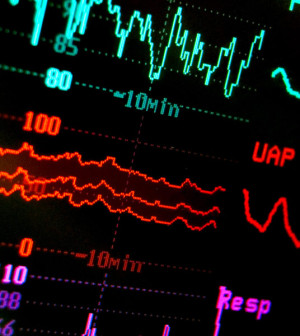- Recognizing the Signs of Hypothyroidism
- 10 Strategies to Overcome Insomnia
- Could Artificial Sweeteners Be Aging the Brain Faster?
- Techniques for Soothing Your Nervous System
- Does the Water in Your House Smell Funny? Here’s Why
- Can a Daily Dose of Apple Cider Vinegar Actually Aid Weight Loss?
- 6 Health Beverages That Can Actually Spike Your Blood Sugar
- Treatment Options for Social Anxiety Disorder
- Understanding the Connection Between Anxiety and Depression
- How Daily Prunes Can Influence Cholesterol and Inflammation
Too Few Americans Aware of Their High Blood Pressure: Study


High blood pressure is a preventable and treatable risk factor for heart attack and stroke, but about one-quarter of adults don’t know they have it, according to a large new study.
Among those who do know they have the condition, many are not likely to have it under control, said lead researcher Dr. Uchechukwu Sampson, a cardiologist at Vanderbilt University Medical School in Nashville.
“Despite all the progress we have made in having available treatment options, more than half of the people we studied still have uncontrolled high blood pressure,” Sampson said.
The study is published in the January issue of the journal Circulation: Cardiovascular and Quality Outcomes.
One in three U.S. adults has high blood pressure, according to the U.S. National Heart, Lung, and Blood Institute. Any reading over 140/90 millimeters of mercury is considered high blood pressure.
The study findings coincided with the Dec. 18 issuing of new guidelines for blood pressure management by experts from the institute’s eighth Joint National Committee.
Among other changes, the new guidelines recommend that fewer people take blood pressure medicine. Older adults, under the new guidelines, wouldn’t be treated until their blood pressure topped 150/90, instead of 140/90.
In Sampson’s study, the researchers evaluated how common high blood pressure was in more than 69,000 men and women. Overall, 57 percent self-reported that they had high blood pressure.
“Among those who reported a history of high blood pressure, more than half of blacks and nearly half of whites had uncontrolled blood pressure,” Sampson said. “Among those who did not report a history of high blood pressure, nearly a third of blacks and nearly a quarter of whites had high blood pressure but were unaware of it.”
The men and women on medications were not likely to be taking drugs considered first-line treatments, the researchers found. This suggests that doctors and patients aren’t following medical guidelines on which drugs to use first and when to add more drugs to further manage blood pressure.
Participants in the study lived in the southeastern United States, an area known for high rates of cardiovascular disease, the researchers said.
Blacks were more likely to be affected than whites, according to the researchers. Those who were extremely obese were more likely to have high blood pressure than those who were not obese.
An expert who reviewed the research said the findings show that high blood pressure is extremely common, and it might not be being treated according to the recommended guidelines.
“This study points out that high blood pressure is still a huge problem in this country,” said Dr. Daniel Kolansky, an interventional cardiologist and associate professor of medicine at the University of Pennsylvania’s Perelman School of Medicine.
Kolansky said doctors typically monitor blood pressure during routine office visits. He offered this advice for patients when talking to their doctors: “You should say, ‘What is my pressure, is it well enough controlled and is there anything further we should do?'”
Sampson said more information is needed to understand why so many people are not getting recommended blood pressure treatments.
More information
To learn more about blood pressure, visit the U.S. National Heart, Lung, and Blood Institute.
Source: HealthDay
Copyright © 2026 HealthDay. All rights reserved.










